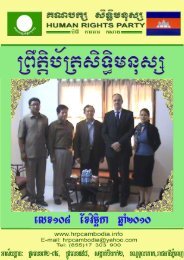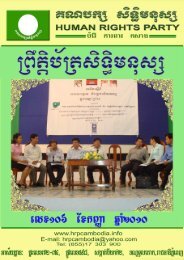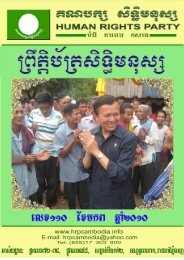Losing Ground - Human Rights Party.
Losing Ground - Human Rights Party.
Losing Ground - Human Rights Party.
Create successful ePaper yourself
Turn your PDF publications into a flip-book with our unique Google optimized e-Paper software.
<strong>Losing</strong> <strong>Ground</strong><br />
Siem Reap, that “the case was suspended,” and there would<br />
be no more arrests. “Go home,” he told them after handing<br />
them a letter that he assured them guaranteed their safety.<br />
However, he also admonished the farmers, as they sat on<br />
the ground in a semicircle around him, telling them that they<br />
had claimed on their complaint to the prime minister that<br />
175 families were affected, but when officials visited them<br />
they discovered that fewer than 40 people were present.<br />
“There have been many similar cases in the past and you<br />
did not show up when the government was providing the<br />
people with a chance to discuss them,” he told them. “You<br />
“We don’t want an investigation after we’ve been<br />
killed. We want the government, NGOs and<br />
reporters to keep an eye on us and intervene.”<br />
Chi Kreang farmer<br />
had your chance and you didn’t show up,” he reiterated,<br />
without mentioning the time, place and venue the farmers<br />
had failed to attend to seek a resolution. “If you need help<br />
go to an NGO,” he told them before wishing them luck and<br />
success in their case.<br />
He spoke to them like they were children, one observer<br />
noted. Still, Mr. Sareth said he felt “warm” when he received<br />
the letter. Although the envelope was unsealed, he would<br />
not even open it to read its content because, he explained,<br />
the official had told him to deliver it directly to Siem Reap<br />
authorities.<br />
Soon after they had been told to leave the pagoda, they<br />
began receiving phone calls warning that provincial police<br />
were threatening their families. These reports of threats were<br />
confirmed over the next few days by the steady stream of<br />
residents from their villages seeking safety in Phnom Penh.<br />
Moreover, the legal advice they were urged to obtain from<br />
NGOs suggested the official letter was not as helpful as they<br />
had been led to believe.<br />
The farmers sought more assistance from NGOs and took<br />
part in a press conference at LICADHO's office on March<br />
30, in which they expressed fear for their safety. “We don't<br />
want an investigation after we've been killed. We want the<br />
government, NGOs and reporters to keep an eye on us and<br />
intervene," Mr. Sareth told the handful of reporters who<br />
showed up. 3<br />
The next day they visited the Land Dispute Resolution<br />
office and on April 1 they marched from Independence<br />
Monument to the National Assembly to call for the release of<br />
the nine jailed farmers, permission to harvest, and the arrest<br />
of the police officer and soldier who had fired on them.<br />
However, one week after their visit to the prime minister’s<br />
estate, a Member of Parliament with the ruling Cambodia<br />
People’s <strong>Party</strong>, denied the government knew about the case.<br />
The MP told The Cambodia Daily that the government had<br />
only received the complaint that morning.<br />
By then the farmers who had fled Siem Reap were finding<br />
it increasingly difficult to find refuge in Phnom Penh. They<br />
had been driven from Hun Sen Park, where they had tried to<br />
sleep, on March 29 by municipal police and were beginning<br />
to feel the capital was becoming an increasingly dangerous<br />
city in which to seek assistance.<br />
“We don’t want to stay in the city because police and<br />
military are chasing us around,” one farmer said. The<br />
55-year-old farmer said, however, that they had no other<br />
option because of the severity of their situation. Without<br />
their land they could not survive, he said.<br />
The farmers sought refuge at Ounalum Pagoda on March<br />
30 but by April 10 they were ordered to leave it. “The order<br />
came from the government,” a monk who had been helping<br />
them said.<br />
Venerable monk Sovath Loun, actually from Chi Kreang,<br />
but who relocated himself to Ounaloum Pagoda after the<br />
crackdown, said he was ordered to stop assisting the farmers<br />
and instruct them to return to Siem Reap. By mid afternoon<br />
all but four had left.<br />
Some were afraid to return to Siem Reap and remained in<br />
hiding.<br />
“After [the groups] arrive here an advisor<br />
comes to meet them quickly and tells them<br />
to move to another place and promises they<br />
will send someone to solve their problem.<br />
Sometimes there are as many as three groups a<br />
day. They come from all over the country, all 24<br />
provinces.”<br />
Vendor near entrance to<br />
Prime Minister Hun Sen’s estate<br />
3<br />
Editors at some Cambodian newspapers say they are overwhelmed with reports on land disputes and lack the staff to investigate all of them.<br />
Forced Evictions and Intimidation in Cambodia<br />
47






